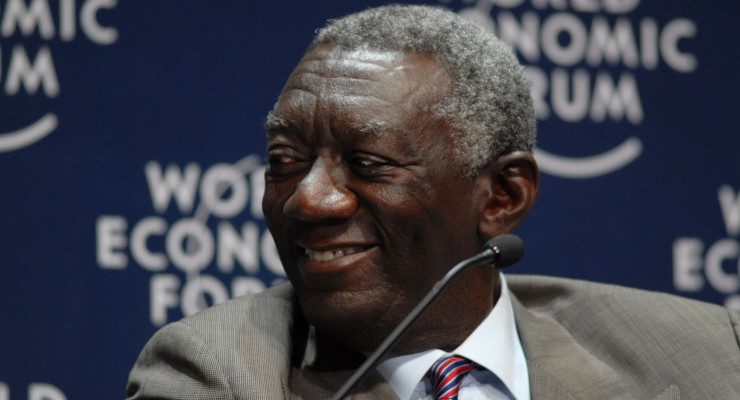Leaders need religion – Former President Kufuor
- Posted on
- Comment
 Former President John Agyekum Kufuor has recommended religion as an important requirement for persons who find themselves in leadership positions.
Former President John Agyekum Kufuor has recommended religion as an important requirement for persons who find themselves in leadership positions.
He was speaking at the Holiday Inn, Accra, last Sunday on the theme, “The Role of Religion In Governance,” during the fourth in a series of Ramadan Lectures organized by the Muslim Youth In Free Enterprise (MYFE).
He said, “Religion offers the tools that a person who finds himself in leadership position in society may apply in steering the affairs of corporate or political governance for the good of society or the organization.”
Continuing, he said that there is nothing more fundamental to good governance than “respect for human rights, the rule of law and the advancement of the general welfare of the people or society being led.”
The teachings of all the known major religions, he pointed out, “preach man’s responsibility to his fellow man, and that we should be one another’s keeper,” adding that “the Bible talks of ‘loving thy neighbour as thyself’ which he noted, is the greatest of all commandments.
Rulers, former President Kufuor said, should be guided by such virtues and the ruled “should be committed to it.”
It was a function which brought together political, religious leaders and others from various walks of life to deliberate on important matters of life and how to fashion out better ways of managing state affairs under the aegis of religion.
Unfortunately, the ruling National Democratic Congress (NDC) was not adequately represented. A certain Alhaji Sheriff was the only known personality from the party who was acknowledged when the MC, Razak Khailani, introduced those present.
The Executive Founding Director of MYFE, Ahmed Abdulai, told DAILY GUIDE on the low representation of the NDC that, “We invited the party, particularly the General Secretary.”
On the responsibility of the citizenry, he said, “Religious virtues should enjoin the citizenry to be obedient to the law and authority, and thereby make for the harmonious co-existence of the ruled under law.”
Civil society participation in governance through pressure groups, lobby and interactivity with the organs and institutions of government and media operations of education, exposure and facilitation of public participation in the discourse of governance, is essential to governance, he told his audience.
He emphasized the importance of religion in governance when he said that, “It is beyond dispute that the rules of what is acceptable for society are largely based on religion.”
He spared some kind words for the National Chief Imam, Sheikh Osman Nuhu Sharubutu, whom he described as a “great leader, scholar and peacemaker.”
The Chief Imam also urged people of different religious backgrounds not to fight one another, especially on grounds of religious differences adding, “If you don’t satisfy your fellow human beings you are not satisfying God.”
The world, he said, is a place that humans will one day leave and so “there is no need to fight for things we will leave one day when we are gone from this world.”
Alhassan Adani, Managing Director of Stanbic Bank and Chairman of the occasion, said that if society is failing it doesn’t mean that religion is failing because religion has set high marks for society to follow, adding that “the breakdown of the family system is partially blamed on the lack of education.”
In attendance were Nana Akufo-Addo, Dr. Mahamudu Bawumia, Alan Kwadwo Kyerematen and other eminent Muslim leaders and scholars.
By Melvin Tarlue








 (Selorm) |
(Selorm) |  (Nana Kwesi)
(Nana Kwesi)